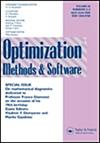非精确张量方法及其在随机凸优化中的应用
IF 1.4
3区 数学
Q3 COMPUTER SCIENCE, SOFTWARE ENGINEERING
引用次数: 9
摘要
我们提出一般非加速[非加速方法的结果首次出现在2020年12月的预印本中(A. Agafonov, D. Kamzolov, P. Dvurechensky和A. Gasnikov, Inexact tens…本文章由计算机程序翻译,如有差异,请以英文原文为准。
Inexact tensor methods and their application to stochastic convex optimization
We propose general non-accelerated [The results for non-accelerated methods first appeared in December 2020 in the preprint (A. Agafonov, D. Kamzolov, P. Dvurechensky, and A. Gasnikov, Inexact tens...
求助全文
通过发布文献求助,成功后即可免费获取论文全文。
去求助
来源期刊

Optimization Methods & Software
工程技术-计算机:软件工程
CiteScore
4.50
自引率
0.00%
发文量
40
审稿时长
7 months
期刊介绍:
Optimization Methods and Software
publishes refereed papers on the latest developments in the theory and realization of optimization methods, with particular emphasis on the interface between software development and algorithm design.
Topics include:
Theory, implementation and performance evaluation of algorithms and computer codes for linear, nonlinear, discrete, stochastic optimization and optimal control. This includes in particular conic, semi-definite, mixed integer, network, non-smooth, multi-objective and global optimization by deterministic or nondeterministic algorithms.
Algorithms and software for complementarity, variational inequalities and equilibrium problems, and also for solving inverse problems, systems of nonlinear equations and the numerical study of parameter dependent operators.
Various aspects of efficient and user-friendly implementations: e.g. automatic differentiation, massively parallel optimization, distributed computing, on-line algorithms, error sensitivity and validity analysis, problem scaling, stopping criteria and symbolic numeric interfaces.
Theoretical studies with clear potential for applications and successful applications of specially adapted optimization methods and software to fields like engineering, machine learning, data mining, economics, finance, biology, or medicine. These submissions should not consist solely of the straightforward use of standard optimization techniques.
 求助内容:
求助内容: 应助结果提醒方式:
应助结果提醒方式:


